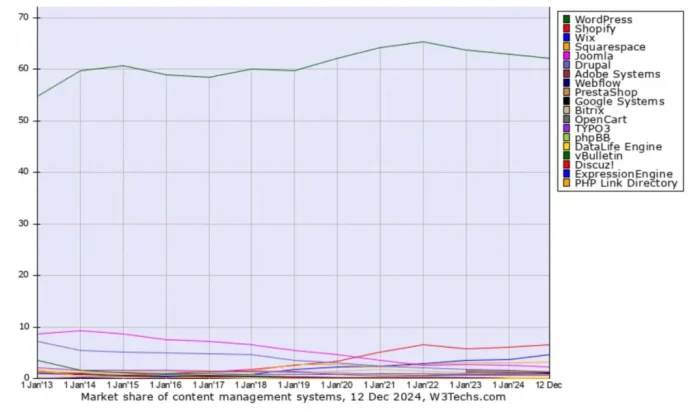Automattic, the company behind WordPress.com, WooCommerce, and other integral components of the WordPress ecosystem, has announced a significant reduction in its contributions to the open-source WordPress.org platform.
The decision, outlined in a public statement, follows an intense legal dispute with managed hosting provider WP Engine. The conflict has not only strained Automattic’s resources but also reignited debates about governance, fairness, and community participation within one of the internet’s most influential open-source projects.
In its announcement, Automattic explained that the reallocation of resources was necessitated by “legal attacks” initiated by WP Engine and “funded by Silver Lake, a large private equity firm.”
Automattic also cited criticism from parts of the WordPress community, which it claims has unfairly targeted its leadership. The company pledged to maintain limited contributions to WordPress.org, focusing on essential updates and security patches, while redirecting the majority of its sponsored development efforts to for-profit projects such as Jetpack, WordPress.com, and WooCommerce.
WP Engine Lawsuit Unveils Deeper Fault Lines
The dispute between Automattic and WP Engine escalated significantly in late 2024, centered around the Advanced Custom Fields (ACF) plugin, a vital tool for developers looking to create custom metadata fields in WordPress.
WP Engine acquired ACF in 2019, integrating it into its hosting ecosystem. However, in October 2024, Automattic introduced a competing fork of the plugin, Secure Custom Fields (SCF), claiming it had identified security vulnerabilities in ACF that required immediate attention.
WP Engine vehemently rejected this rationale, describing the move as a “hostile takeover.” In a statement, WP Engine argued that Automattic’s actions “pose the grave risk of upending and irreparably harming the entire WordPress ecosystem.”
WP Engine alleged that Automattic had exploited its dual role as a commercial entity and steward of WordPress.org to unfairly disadvantage competitors.
Court documents revealed that Automattic had imposed IP blocks and restricted WP Engine’s access to WordPress.org resources. Additionally, Automattic demanded that WP Engine either pay a royalty fee equal to 8% of its gross revenue or allocate equivalent staffing contributions to regain full access to WordPress.org.
These actions, WP Engine claimed, amounted to anti-competitive practices that harmed not only its business but also the broader WordPress community.
Federal Injunction Marks Turning Point
In December 2024, a federal judge issued a preliminary injunction against Automattic, ordering the company to reverse several measures targeting WP Engine. Judge Araceli Martínez-Olguín, presiding over the case, stated that Automattic’s actions “disrupted WP Engine’s operations and marginalized the company within the WordPress ecosystem.”
The court mandated Automattic to restore WP Engine’s access to WordPress.org, undo the changes made to ACF, and remove IP blocks directed at WP Engine.
The ruling was hailed by WP Engine as a victory for fairness and open-source principles. In a statement, the company described the court’s decision as as necessary to restore fairness and balance within the WordPress ecosystem.
Automattic, however, downplayed the injunction, characterizing it as a temporary measure while legal proceedings continue.
WordPress.org Service Suspension Fuels Controversy
Amid the escalating legal tensions, Automattic announced in December 2024 that it would temporarily suspend several WordPress.org services, including new account registrations, plugin submissions, and user reviews.
Matt Mullenweg, founder of Automattic and a key figure in the WordPress project, framed the suspension as a holiday break intended to give volunteers and contributors a much-needed respite.
Critics, however, questioned the timing of the announcement, noting its proximity to the court’s injunction. The suspension disrupted workflows for developers and users who rely on WordPress.org for essential activities such as plugin development and project management.
While services resumed in January 2025, the temporary freeze highlighted the fragility of WordPress.org’s governance model and raised concerns about the platform’s resilience in the face of legal and organizational challenges.
Governance Challenges in Open-Source Communities
The legal battle has brought renewed scrutiny to Automattic’s role within the WordPress ecosystem. As the steward of WordPress.org, Automattic wields considerable influence over plugin development, distribution, and enforcement of community guidelines.
The dual role, critics argue, creates an inherent conflict of interest that may stifle competition and discourage third-party contributions.
The forced fork of ACF has become a focal point in these debates, with many developers expressing confusion and frustration over the existence of parallel versions of the plugin.
Some developers unknowingly migrated to SCF, while others criticized Automattic’s decision as an overreach that undermines the collaborative spirit of open-source development.
In its defense, Automattic has emphasized its commitment to the platform’s security and sustainability. “We’re excited to return to active contributions to WordPress core, Gutenberg, Playground, Openverse, and WordPress.org when the legal attacks have stopped,” the company stated. However, the incident has prompted calls for reforms to WordPress.org’s governance structure, including proposals for more independent oversight.
Broader Implications for Open-Source Ecosystems
The Automattic-WP Engine conflict underscores the complexities of managing open-source projects in an increasingly commercialized landscape. WordPress, which powers more than 40% of the web and has a CMS market share of over 60%, depends on contributions from individuals and companies, creating a delicate balance between community-driven ideals and commercial interests.
The case has sparked broader discussions about the responsibilities of dominant players in open-source ecosystems. Automattic’s actions, while framed as protective measures, have raised questions about the extent to which centralized control can coexist with the principles of openness and collaboration.
For the WordPress community, the stakes are high. The outcome of this dispute could set precedents for how open-source projects navigate power dynamics, resolve conflicts, and maintain trust among contributors and users. As legal proceedings continue, the WordPress ecosystem faces an uncertain future, with its core values of openness and inclusivity hanging in the balance.

